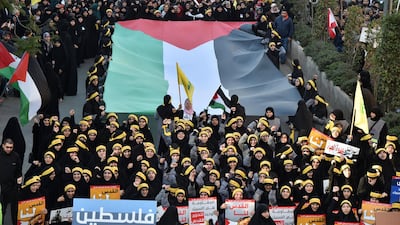Tens of thousands rallied in Beirut’s southern suburbs on Monday afternoon, chanting “death to America” and “death to Israel” and declaring that Jerusalem will always be the capital of Palestine.
The rally, organised by Hizbollah, was Lebanon’s largest demonstration so far against US president Donald Trump’s decision last week to recognise Jerusalem as the capital of Israel.
Hizbollah leader Hassan Nasrallah addressed the crowd live via video, praising Palestinian demonstrators who have clashed daily with Israeli security forces in Jerusalem and the occupied Palestinian territories since the announcement.
“We witness today a true intifada,” Mr Nasrallah said, referring to previous uprisings by Palestinians against Israeli occupation. "the most important response to Trump today is to announce an intifada.”
Mr Trump’s decision has been widely condemned by Lebanese and other Arab and other world leaders.
“We are proud of our Lebanese unity around the Palestinian cause and the righteous cause of Al Quds,” Mr Nasrallah said, using the Arabic name for Jerusalem.
Mr Nasrallah called on the “resistance axis” — a reference to Hizbollah and its Syrian and Iranian allies and patrons — to “devote all its power and time to the Palestinians. I call on all the resistance factions in the region to unite and put one common strategy and practical plan to face this threat,” he said.
Mr Nasrallah referred to Mr Trump’s announcement as “arrogant” and pointed out that most governments around the world consider Jerusalem an occupied city and that control of it should be part of a deal negotiated between Israelis and Palestinians.
“The US decision is not isolated, it came in the context of a regional plot to destroy our nation,’ Mr Nasrallah said. “America is not a sponsor of peace in the region, it is the sponsor of war and terrorism, it is the sponsor of ISIL, it is the enemy that everyone must stand in its face and chant ‘death to America.’”
The notion that the US provides support for ISIL — even while supporting the Iraqi government in its campaign against the extremist group — has wide currency in Syria and Iraq, and touches on regional dynamics that are becoming sharper as Hizbollah emerges emboldened from its successful military intervention on behalf of the Syrian and Iraqi governments and refocuses on Israel, its traditional enemy.
In 2006, Israel fought a war against Hizbollah in Lebanon that killed more than 1,200 Lebanese, mostly civilians, and 120 Israelis, most of them soldiers.
Hizbollah’s growing power regionally has led to fears of a contiguous geographical area of Iranian influence that stretches from Tehran to Beirut. A video that emerged last week of an Iranian-supported Iraqi militia leader visiting southern Lebanon in the company of Hizbollah members drew criticism from some Lebanese leaders, with prime minister Saad Hariri calling the visit “a violation of Lebanese law.”
The militia leader, Qais Al Khazali, is the head of Asaib Ahl Al Haq, a group that once fought US troops in Iraq and more recently has aided the Iraqi government in its battle against ISIL.
“An outraged Israel correctly interpreted this to mean that ‘Hizbullah is trying to highlight that it is now a regional power with international partners ready to fight alongside it," said Amal Saad, a professor of political science at Lebanese University. “In fact, other [Iraqi] factions recently threatened to partake in any war to liberate Jerusalem.”
US officials have said Mr Trump’s decision to move the US embassy from Tel Aviv to Jerusalem will take at least two to three years to be implemented.
The move breaks with decades of US foreign policy, which along with governments in most of the rest of the world and two United Nations resolutions, stipulates that control of Jerusalem should be decided as part of negotiations between Palestinians and the Israeli government.
There have been regular demonstrations in Lebanon’s Palestinian camps since the announcement, and police used tear gas and batons against demonstrators outside the US embassy in Lebanon on Sunday.
There are more than 400,000 Palestinian refugees registered with the United Nations in Lebanon, many living in the country’s 12 official “camps”, which are in reality cities made up largely of concrete apartment blocks.

